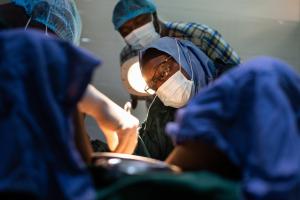Inequitable access to vaccines and high-performance screening tools is hampering efforts to effectively reduce the growing burden of cervical cancer in the African region, which accounts for the highest rates of new cases and deaths due to the disease.
Despite being preventable and treatable through human papillomavirus (HPV) vaccination and screening, and curable when detected early, cervical cancer remains the most common cause of cancer-related deaths in the African region. Of the more than 76 000 cervical cancer deaths globally in 2022, the most updated data available, nearly a quarter (23%) were in Africa.
At a special event during the Seventy-fourth session of the World Health Organization (WHO) Regional Committee for Africa, being hosted by the Republic of the Congo in Brazzaville this week, African health ministers and partners highlighted the urgent need for equitable access to affordable HPV vaccines and HPV DNA testing, to accelerate progress towards elimination.
To date, only 28 countries in the African region have introduced HPV vaccines into routine immunization programmes, with just four of these achieving 90% vaccination coverage in 2023. For screening, surveys reveal very low coverage of about 11%. Only 17 countries have introduced HPV-based screening, albeit not nationally, highlighting the importance of an integrated person-centred approach.
“Cervical cancer services need to be integrated throughout the life course to leverage the opportunities of other programs within the health system”. I urge all to collectively work together in awareness creation for the fight against cervical cancer”, noted, Mr Gilbert Mokoki, Minister of Health of Congo, speaking on behalf of the First lady of Congo, H.E Antoinette Sassou N’Guesso.
According to modelling by HPV-ADVISE, involving 40 countries in sub-Saharan Africa, current vaccination coverage and screening uptake rates are inadequate to enable elimination of cervical cancer by 2100. However, if countries achieve and maintain the WHO-recommended 90% vaccination coverage for girls, and 70% screening uptake targets, the modelling shows that 24 million cervical cancers would be averted by the turn of the century.
“The burden of cervical cancer in Africa is a stark illustration of the impacts of global inequities, which exacerbate barriers including scarce resources, lack of prioritization by funders, and ultimately, limited capacity to manage the threat. Affordable and accessible HPV tests and vaccines are critical if we are to accelerate elimination of cervical cancer as a public health problem in the region, and narrow the wide gap in health inequality globally,” said Dr Matshidiso Moeti, WHO’s Regional Director for Africa.
The special event at the Regional Committee aimed to spark high-level political advocacy and partner buy-in, specifically the initiation of a joint regional mechanism to increase access to HPV vaccines and HPV-based tests, so boosting cervical cancer screening and prevention coverage.
A critical element for success, WHO stressed is the delivery of cervical cancer services within a people-centred, primary health care approach, to ensure accessibility and sustainability. In Cameroon, Malawi, Uganda and Zimbabwe, for example, cervical cancer screening has been integrated into HIV and sexual and reproductive health services.
The proven cost-effectiveness of these interventions supports the argument for broader implementation, with all eligible women who visit health facilities, at any level, being offered comprehensive cervical cancer services.
“As partners, we need to take advantage of the overlap between cervical cancer and other services for women, such as HIV programs and reproductive health services, to ensure integration at policy, financing, programme and service level,” said Dr Phillipe Duneton, Executive Director of Unitaid.
World Health Organization







OTHER ARTICLES
Editorial — Prevent, inform, and act for women’s health in Africa
Kenya : Government Prioritises Maternal Health and Strengthens Support for Community Health Promoters
Strengthening pandemic prevention, preparedness, and response capacities in Senegal using the “One Health” approach